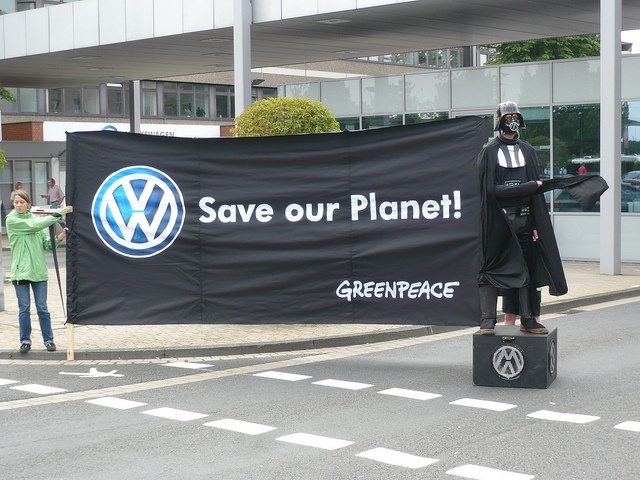Volkswagen deserves its day in criminal court

Greenpeace climate activists in Germany sought to draw attention to what it called Volkwagen's "dark side" back in 2011. In the wake of the company's international emissions cheating scandal, U.S. authorities are looking into criminal charges. (Photo by GuenterHH via Flickr.)
By Phil Mattera, Dirt Diggers Digest
Volkswagen's scheme to circumvent federal emissions regulations for millions of its cars cries out for tough prosecution. Yet it turns out that a little known loophole in the Clean Air Act exempts the automobile industry from criminal penalties.
EPA and Justice Department prosecutors are apparently considering whether criminal charges can be brought under other statutes, but it remains to be seen whether they will be successful. An inability to do so would be a major embarrassment for DOJ, which recently proclaimed its intention to move away from deferred prosecution agreements and get tougher with corporate culprits.
In case anyone questions the appropriateness of criminal charges in environmental cases, it is worth recalling that this approach has ample precedents. While it is true that many of the cases in the EPA's criminal docket involve individuals at fly-by-night firms, that's not always the case.
In fact, as part of the preparation for the Violation Tracker database my colleagues and I at Good Jobs First will release later this month, I've been going through the records. Here are some of the highlights:
The granddaddy of criminal environmental cases was the prosecution of BP for its role in the 2010 Deepwater Horizon disaster that killed 11 people and did untold damage to the Gulf of Mexico. In November 2012 BP pled guilty to environmental crimes (involving the Clean Water and Migratory Bird Treaty Acts) as well as felony manslaughter and obstruction of Congress. It was required to pay criminal fines and penalties of $4 billion.
In February 2013 Transocean, the company from which BP leased the ill-fated drilling rig, pleaded guilty to charges of violating the Clean Water Act in the period leading up to the accident and was sentenced to pay $400 million in criminal fines and penalties. Halliburton, which was responsible for cement work at the site, pleaded guilty to a charge of destroying evidence.
Oil companies are not the only defendants. In 2013 Wal-Mart Stores pleaded guilty to six counts of violating the Clean Water Act by illegally handling and disposing of hazardous materials at its retail outlets across the country. It had to pay $81 million in penalties.
This year, Duke Energy pleaded guilty to nine criminal violations of the Clean Water Act at several of its facilities in North Carolina and paid a $68 million criminal fine and was required to spend $34 million on environmental projects.
Volkswagen certainly belongs on this dishonor roll of environmental culprits. In fact, it probably deserves harsher punishment than even BP, given the brazen and intentional aspects of its behavior.
In reporting on the auto industry loophole, the Wall Street Journal quoted former Michigan Rep. John Dingell as justifying the provision by saying that civil penalties were "easier, speedier quicker" than criminal sanctions and warning regarding the latter: "The risk of them going out of business is very real."
In cases such as this one, the convenience of prosecutors should not be a priority, and there are many people who may think that VW's disappearance would not be a bad thing.
